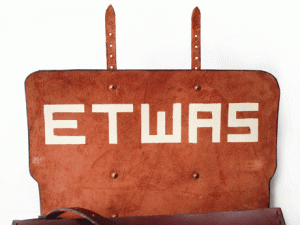 This article was originally written in 2010 after Will Lisak, founder of ETWAS Bags first got in touch with OTC. It was in the form of a challenge.
This article was originally written in 2010 after Will Lisak, founder of ETWAS Bags first got in touch with OTC. It was in the form of a challenge.
Will commented on a post about Jack Bauer’s bag, from the television show “24,” stating that his bag was tougher than Jack’s. After getting to know more about Will and his company, ETWAS, German for “something,” we had little reason to doubt.
So, it was with satisfaction that we recently saw Will and his bags profiled in Issue 2 if the outstanding new menswear and lifestyle magazine, Port. It’s a wonderful examination of this prolific and highly principled guy, focusing on Will’s absolute commitment to long-term style and minimal impact.
Some brands talk about civic and social good, ETWAS smacks you across the face with it. More than that, Will backs it up all the way, as you will see below. And, by the way, these clean, classic, modern bags are outstanding.
So, with ETWAS’ belated but growing appreciation among the style/craftsman/heritage cognoscenti, OTC is happy to remind everyone that we knew all this way back when.
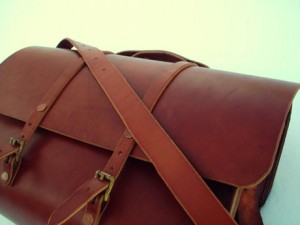 Will is a graphics design graduate whose dad taught him how to make small leather goods while growing up in western Pennsylvania. In fact, the tannery near his childhood home is where Will now gets the exceptionally fine and thick hides for his ETWAS bags.
Will is a graphics design graduate whose dad taught him how to make small leather goods while growing up in western Pennsylvania. In fact, the tannery near his childhood home is where Will now gets the exceptionally fine and thick hides for his ETWAS bags.
A pragmatic guy, Will designed his original bag to simply fit a need at hand. He wanted a bike bag that served the practical purpose of carrying stuff while reflecting his aesthetic and environmental concerns.
Will tells OTC, “I wanted to create my ideal bag, not something was going to be dated in a few years.” The resulting prototype was simple, plain, sturdy and functionally stylish. It’s reminiscent of a classic dispatch case but also embodies distinct elements of a messenger bag.
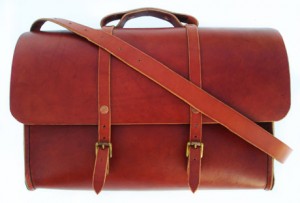 Two narrow but sturdy straps secure a single, giant compartment. On either end of the bag, D-rings provide additional functionality. The solid brass hardware is sturdy but simple, almost discreet. On the front of the bag, those two straps can also be used to store a small notebook or folded newspaper.
Two narrow but sturdy straps secure a single, giant compartment. On either end of the bag, D-rings provide additional functionality. The solid brass hardware is sturdy but simple, almost discreet. On the front of the bag, those two straps can also be used to store a small notebook or folded newspaper.
The bag’s body consists of three pieces: the center wrap that creates the front, back, bottom and top flap; and the two side panels. This clean, almost minimalist design creates the illusion of compactness, but don’t be fooled. It’s actually a big bag. The overall message this bag sends is one of near-familiarity. You think you recognize it, but quickly realize that, no, it’s something different.
What’s also distinctive is its inherent imperfection. Since it’s entirely handmade – no machines whatsoever – there is a rustic roughness to the bag’s finishing. The edges are raw, except on the darker stained versions. On the leather’s unfinished underside, you may very well spot template markings from when the maker went a bit off course.
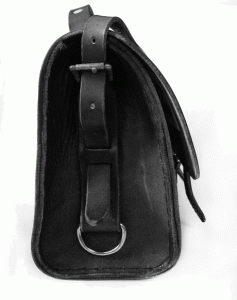 So, each bag bears the nuances and hallmarks of the person who made it. My own bag’s minimal idiosyncrasies don’t bother me at all. Quite the opposite; I often wonder about the craftsman who made it. Because of the personal nature of their construction, each bag takes about five hours to make; the connection between maker and owner is almost tangible.
So, each bag bears the nuances and hallmarks of the person who made it. My own bag’s minimal idiosyncrasies don’t bother me at all. Quite the opposite; I often wonder about the craftsman who made it. Because of the personal nature of their construction, each bag takes about five hours to make; the connection between maker and owner is almost tangible.
The real star of this bag is the outstanding leather that Will sources. Thick and stiff, it takes time to wear in and though it will never really soften in the traditional sense, it will conform to the owner’s body and ease over time. It’s just beautiful stuff – from, as it turns out, a tannery close to where he grew up. The regular compliments I receive are evenly split between the bag’s overall look and the leather itself.
When you buy an ETWAS bag, you are investing in the kind of manufacture that is the antithesis of name brand large-scale production. While not inexpensive, with the original version starting at $600.00, Will could easily charge much more based on material and labor costs alone. With ETWAS, you are buying outstanding durability, one of a kind design and a genuine belief in keeping local, staying green and dedication to quality.
Will’s commitment to thoughtful production is evident in the fact that there is no ETWAS factory. Work is primarily done in a Brooklyn co-op facility. But everything needed to make an ETWAS bag can be found in the Design Box, a totally portable workshop that allows each craftsman to set up shop wherever he happens to be. It’s more of a collective effort than it is a traditional start-up.
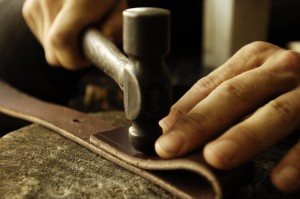 The individual leather worker is the brawn that crafts every bag by hand. And by handmade, I mean no machines at all; not even for the Goodyear stitching on saddle-thick leather end panels.
The individual leather worker is the brawn that crafts every bag by hand. And by handmade, I mean no machines at all; not even for the Goodyear stitching on saddle-thick leather end panels.
They use a reinforced palm cushion to help drive a giant needle through the hide – no easy task. And true to his green beliefs they don’t even use any artificial lighting. When the sun goes down, they’re done for the day.
There are now three models available, the original Standard #1, a more compact version called the Light Pack and a tool bag-cum-purse. Will is working to get his bags into more stores in Manhattan and to increase the brand’s online awareness. OTC wishes him luck and is honored to be an ETWAS kind of guy.
To learn more about ETWAS the company and its dedication to low-impact manufacturing, environmental sustainability and craftsmanship, please visit the company’s website.
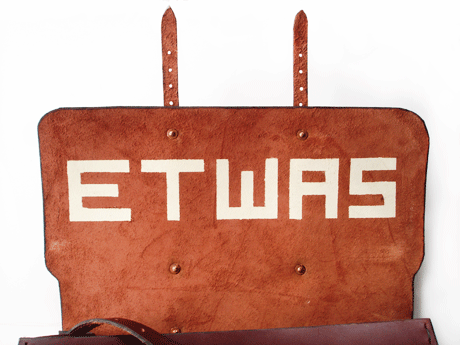
Hi OTC. From the moment I saw Will’s Standard #1, I fell in love. I’ve been trying to get in touch with Will to purchase one, with no avail. I would be immensely grateful for any help. Thank you.
Best,
Erik
Erik, I’ll try and get in touch with Will as well. By the way, love your site!
Well researched and well written post! Subscribing to this right now!
Well researched and well written post! Subscribing to this right now!
Appreciate for the terrific website comments. Like your updates. Will pop back All of the best.
Thank you for this article. Whitespace is something I have ignored in the past, but will make use of in the future.
interesting post I no longer buy The Sun newspaper at work
great article I am a massive fan of the sun